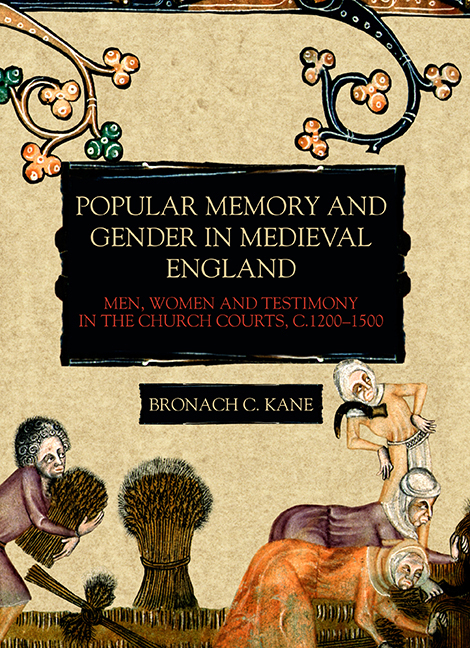 Popular Memory and Gender in Medieval England
Popular Memory and Gender in Medieval England In 1270, Sibilla de Hinteworth testified in a matrimonial suit that reached the Court of Canterbury on appeal from the archdeaconry of Huntingdon. Despite the preference for male witnesses in most cases in the English ecclesiastical courts at the time, a large number of women remembered the birth of the female party in the case, Cecilia, daughter of Bartholomew, to prove that she was under the approved age of twelve at the time of the marriage. Sibilla told the clerical examiner that she remembered the child's birth as she ‘was deflowered during the Lent that next followed’. She gave no further details about the circumstances surrounding her experience, an absence compounded by the shifting meaning assigned to the act of deflowering in this period. In manorial communities, ‘deflorata’ was most commonly used to describe women's loss of virginity outside marriage, appearing in fines made upon bondwomen and the female poor for fornication or illegitimate children. It also surfaced in some accounts of rape and sexual assault, accompanied by language that implied physical force, and lay behind payments of compensation for damage to women's marital value.
The fragmentary nature of Sibilla's memory alludes to the marginalisation of women's voices in a range of suits in the medieval church courts. The focus of her account simultaneously underscores the potential for female memories to subvert clerical assumptions about women's speech and sexual shame. Other women witnesses in the case recalled childbirth, marriages, work, and the deaths of kin in patterns that diverged to an extent from the recollections of men in comparable situations. Yet Sibilla's memory implies the ability for non-elite women not only to testify in suits that mattered in their local communities, but also to articulate rather than suppress gendered sexual experiences that involved contact with manorial or Church authorities.
This book traces everyday perceptions and uses of the past among non-elite men and women in England from the early thirteenth century to the end of the fifteenth century. It draws on the wealth of detailed legal testimony on a variety of issues that survives for the church courts of Canterbury and York, and opens up these archives for further study by medievalists in various areas. This is not a procedural history of canon law in the English church courts, although it speaks to many of the themes that concern scholars in that field.
To save this book to your Kindle, first ensure [email protected] is added to your Approved Personal Document E-mail List under your Personal Document Settings on the Manage Your Content and Devices page of your Amazon account. Then enter the ‘name’ part of your Kindle email address below. Find out more about saving to your Kindle.
Note you can select to save to either the @free.kindle.com or @kindle.com variations. ‘@free.kindle.com’ emails are free but can only be saved to your device when it is connected to wi-fi. ‘@kindle.com’ emails can be delivered even when you are not connected to wi-fi, but note that service fees apply.
Find out more about the Kindle Personal Document Service.
To save content items to your account, please confirm that you agree to abide by our usage policies. If this is the first time you use this feature, you will be asked to authorise Cambridge Core to connect with your account. Find out more about saving content to Dropbox.
To save content items to your account, please confirm that you agree to abide by our usage policies. If this is the first time you use this feature, you will be asked to authorise Cambridge Core to connect with your account. Find out more about saving content to Google Drive.